读后续写和概要写作讲义 概要中词的替换
- 格式:docx
- 大小:20.34 KB
- 文档页数:4

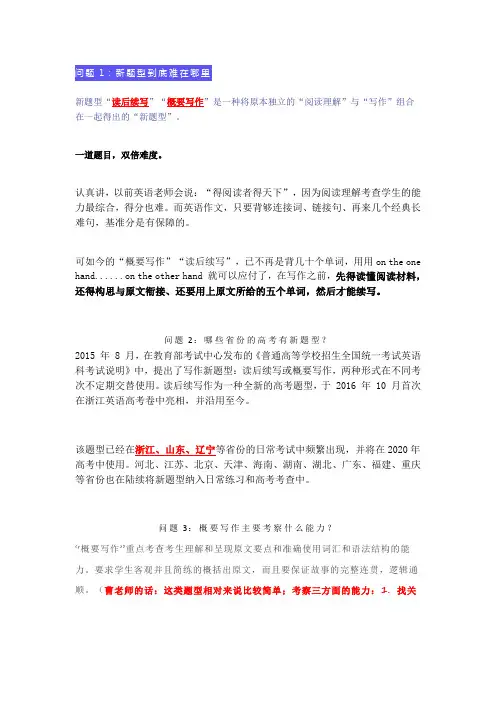
1新题型“读后续写”“概要写作”是一种将原本独立的“阅读理解”与“写作”组合在一起得出的“新题型”。
一道题目,双倍难度。
认真讲,以前英语老师会说:“得阅读者得天下”,因为阅读理解考查学生的能力最综合,得分也难。
而英语作文,只要背够连接词、链接句、再来几个经典长难句,基准分是有保障的。
可如今的“概要写作”“读后续写”,已不再是背几十个单词,用用on the one hand......on the other hand 就可以应付了,在写作之前,先得读懂阅读材料,还得构思与原文衔接、还要用上原文所给的五个单词,然后才能续写。
问题2:哪些省份的高考有新题型?2015 年 8 月,在教育部考试中心发布的《普通高等学校招生全国统一考试英语科考试说明》中,提出了写作新题型:读后续写或概要写作,两种形式在不同考次不定期交替使用。
读后续写作为一种全新的高考题型,于 2016 年 10 月首次在浙江英语高考卷中亮相,并沿用至今。
该题型已经在浙江、山东、辽宁等省份的日常考试中频繁出现,并将在2020年高考中使用。
河北、江苏、北京、天津、海南、湖南、湖北、广东、福建、重庆等省份也在陆续将新题型纳入日常练习和高考考查中。
问题3:概要写作主要考察什么能力?“概要写作”重点考查考生理解和呈现原文要点和准确使用词汇和语法结构的能力。
要求学生客观并且简练的概括出原文,而且要保证故事的完整连贯,逻辑通顺。
(曹老师的话:这类题型相对来说比较简单;考察三方面的能力:1. 找关键词的能力;2. 把关键词写成正确句子的能力;3. 把句子写成合理的段落的能力)问题4:读后续写考察什么能力?读后续写主要关注学生以下四个方面的能力:①把握短文关键信息和语言特点的能力。
学生需要了解所给短文的主要内容,清楚其关键词和语言结构的使用情况,并通过续写短文表现出来。
②语言运用的准确性和丰富性。
学生能准确、恰当地使用所学词汇和语言结构,还能够根据内容需要使用较多、较复杂的词汇和语言结构。
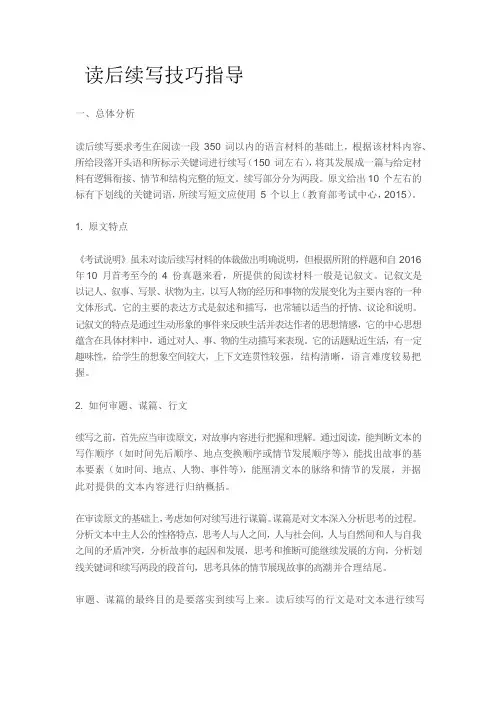
读后续写技巧指导一、总体分析读后续写要求考生在阅读一段350 词以内的语言材料的基础上,根据该材料内容、所给段落开头语和所标示关键词进行续写(150 词左右),将其发展成一篇与给定材料有逻辑衔接、情节和结构完整的短文。
续写部分分为两段。
原文给出10 个左右的标有下划线的关键词语,所续写短文应使用5 个以上(教育部考试中心,2015)。
1. 原文特点《考试说明》虽未对读后续写材料的体裁做出明确说明,但根据所附的样题和自2016 年10 月首考至今的4 份真题来看,所提供的阅读材料一般是记叙文。
记叙文是以记人、叙事、写景、状物为主,以写人物的经历和事物的发展变化为主要内容的一种文体形式。
它的主要的表达方式是叙述和描写,也常辅以适当的抒情、议论和说明。
记叙文的特点是通过生动形象的事件来反映生活并表达作者的思想情感,它的中心思想蕴含在具体材料中,通过对人、事、物的生动描写来表现。
它的话题贴近生活,有一定趣味性,给学生的想象空间较大,上下文连贯性较强,结构清晰,语言难度较易把握。
2. 如何审题、谋篇、行文续写之前,首先应当审读原文,对故事内容进行把握和理解。
通过阅读,能判断文本的写作顺序(如时间先后顺序、地点变换顺序或情节发展顺序等),能找出故事的基本要素(如时间、地点、人物、事件等),能厘清文本的脉络和情节的发展,并据此对提供的文本内容进行归纳概括。
在审读原文的基础上,考虑如何对续写进行谋篇。
谋篇是对文本深入分析思考的过程。
分析文本中主人公的性格特点,思考人与人之间,人与社会间,人与自然间和人与自我之间的矛盾冲突,分析故事的起因和发展,思考和推断可能继续发展的方向,分析划线关键词和续写两段的段首句,思考具体的情节展现故事的高潮并合理结尾。
审题、谋篇的最终目的是要落实到续写上来。
读后续写的行文是对文本进行续写和完善的过程。
在内容上,要关注预设情节的逻辑性、合理性和思想性,要展现故事的主题、思想或哲理。
在语言上,要回看、体会并模仿原文的语言风格,以人物的动作、语言、心理描写为主,辅之以外貌和神态描写以及环境描写。
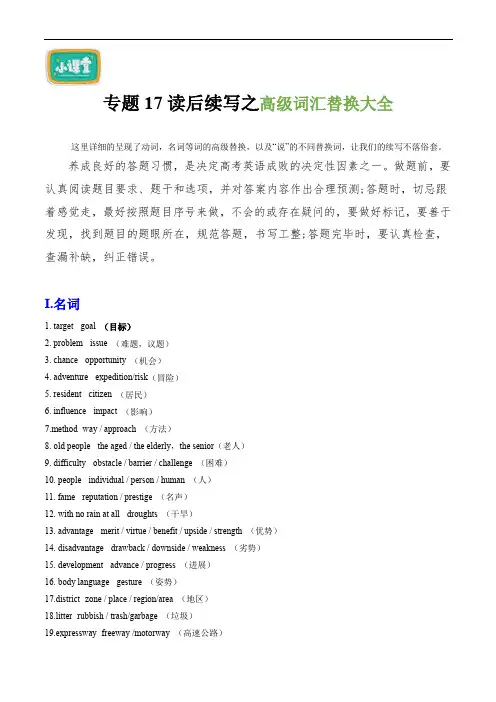
专题17读后续写之高级词汇替换大全这里详细的呈现了动词,名词等词的高级替换,以及“说”的不同替换词,让我们的续写不落俗套。
养成良好的答题习惯,是决定高考英语成败的决定性因素之一。
做题前,要认真阅读题目要求、题干和选项,并对答案内容作出合理预测;答题时,切忌跟着感觉走,最好按照题目序号来做,不会的或存在疑问的,要做好标记,要善于发现,找到题目的题眼所在,规范答题,书写工整;答题完毕时,要认真检查,查漏补缺,纠正错误。
I.名词1. target - goal (目标)2. problem - issue (难题,议题)3. chance - opportunity (机会)4. adventure - expedition/risk(冒险)5. resident - citizen (居民)6. influence - impact (影响)7.method- way / approach (方法)8. old people - the aged / the elderly,the senior(老人)9. difficulty - obstacle / barrier / challenge (困难)10. people - individual / person / human (人)11. fame - reputation / prestige (名声)12. with no rain at all - droughts (干旱)13. advantage - merit / virtue / benefit / upside / strength (优势)14. disadvantage - drawback / downside / weakness (劣势)15. development - advance / progress (进展)16. body language - gesture (姿势)17.district- zone / place / region/area (地区)18.litter- rubbish / trash/garbage (垃圾)19.expressway- freeway /motorway (高速公路)20.wealth- fortune / property /fiance/ treasure(财富,财产)21. economic downturn - economic depression/crisis (经济低迷)II.动词1.get- acquire / obtain/ gain (得到)2. reduce - decrease / lessen / cut/ crash (减少)3. improve - promote / enhance (改进)4. help - assist / aid (帮助)5. have - possess / own (拥有)6. agree ( with )- approve (同意)7. thank - appreciate (感谢)8.walk- cover,wander (步行)9.express- convey (表达)10.make sure - ensure (确保)11. solve - cope with / deal with / resolve (解决)12.encourage- motivate / fuel /inspire(鼓励,激发)13. think - claim / consider / believe / insist / maintain / hold / argue (认为)14. keep - preserve / reserve / maintain,stay/ remain(保持)15. damage - hurt / injure / harm / impair /undermine (损害)16.give-offer / provide / supply (给与)17. develop - cultivate / foster (培养)18. declare - claim (宣称)19. protect - conserve / preserve (保护)20. prevent - stop (阻止)21. ensure - assure / guarantee (确保)22. clear - eliminate / remove (消除)23. care- take care of / look after/ tend/ attend (照顾)24.undergo- experience / go through(经历)25. lead to - bring about / result in / cause (导致)26. request - demand / need / require /want(要求)27. show - reveal / illustrate / demonstrate / present / unveil(展示/揭示)28.book- reserve (预订)29. grow to - rise to / increase to . climb to / jump to (增长至)30.put off - delay/ postpone (推迟)31. fall to - decline to / decrease to / drop to / reduce to/ crash to (低至)32. give permission to do - allow/permit sb to do (允许)33. look like - resemble (相似)34. be interested in - be crazy about / have passion for/ show great interest in (感兴趣)35. set off for - head for / leave for/ start for(出发去某地)36. speed up - accelerate (加速)37.make- enable (使)38.switch- convert / transform (转换)39.forbid- ban / prohibit (禁止)40. build - establish/ found (建立)41. be short of -( a ) lack of / be lacking in (不足/缺少)42. tell sth / sb apart - distinguish (区分)43.reveal- expose (暴露)44. deal with - handle (处理)45. make full use of - make the most of /take advantage of (充分利用)46.take actions - take measures (采取行动、措施)47.be made of - be composed of / consist of (由...组成)48. change- transform /alter/ turn (改变)49.take up - account for / make up / occupy (占)50. be firmly convinced - believe firmly/ have firm belief in (坚信)51. put one ' s heart into - be absorbed in / be bent on / be buried in (专心致志于)52. in comparison with - compared with / compared to / in comparison to (与……相比)53.do sth to the best of one ' s ability - try one ' s best to do / spare no effort to do / make every effort to do / do what one can to do / go all out to do (尽力做某事)54.sustain - support / maintain (维持)55.accomplish- achieve / finish /complete (完成)56.shoulder/ undertake one ' s duty - be responsible for / take responsibility (承担责任)57. be on the rise - climb up / increase (增加)58.raise doubt about - cast doubt on / be skeptical about(对…怀疑)59. associate with - connect to/ relate to /be associated with /link to (与……联系)60. manufacture- produce (制造)61. be devoted to doing - be committed to doing / be absorbed in/ be buried in / be lost in / be involved in /apply oneself to (致力于)62. stand up - rise to one’s feet (站起来)III.形容词1. sad - depressed /frustrated /upset/ in low spirit/feel down/ feel blue (悲伤的)2. rich - wealthy / well - off (富有的)3. in poverty - poor / needy / in need (穷的)4. happy - cheerful / delightful (开心的)5.a small number of - a handful of (少量的)6. bad - wicked / negative / awful / dreadful / undesirable (坏的)7. clever - smart / gifted / sharp - minded /intelligent /wise(聪明的)8. difficult - tough / challenging / stressful / demanding (难的)9.big-- enormous / vast / massive (巨大的)10. afraid - frightened / scared / panic - stricken (害怕的)11.many- a sea of / an ocean of / abundant / numerous / considerable/plenty of (许多)12.beautiful-- eye -catching / good - shaped / appealing / charming / fascinating/attractive (美丽的)13. rude- impolite (粗鲁的)14. a variety of -- different / diverse / various (不同的)15.worn out - tired / exhausted (疲劳的)16.boring- dull / tiresome (乏味的)17. doubtful - skeptical / suspicious (怀疑的)eful -- helpful / beneficial / profitable / rewarding / advantageous (有益的)19. initial - original (最初的)20. of great importance - significant / of great significance / essential / fundamental / vital / critical / indispensable (重要的)21.new- fresh / brand - new (新的)22.not uncommon - common (常见的)23. angry - annoyed / irritated (生气的)24.fundamental- basic (基本的)25. in abundance - be rich in (富于...)26.severe- serious (严重的)27. traditional - conventional (传统的)28.obvious- apparent / evident / clear (显然的)29. brave - fearless / courageous / bold (勇敢的)30. famous - notable / well-known (著名的)31.reasonable- sensible /rational (理性的)32. precise - exact (精确的)33. abundant - ample / plentiful (充足的)34. resemble - be similar to (类似的)IV.副词替换1. on the contrary - oppositely (相反)2. rarely - seldom/ hardly (很少)3.only- merely (仅仅)4. day in and day out - every day (每天)5. firstly - originally / initially (起先)6. totally - absolutely / evidently / completely (完全地)7.approximately- almost / about / around / nearly / roughly (大约)8. finally - eventually / accordingly /ultimately (最终)19. certainly - definitely / undoubtedly / obviously / apparently (一定地,无疑地)10.at present - nowadays / recently (目前)11.now and then - at times /occasionally /from time to time (时不时,偶尔)12. frequently - constantly / always (经常,总是)13/ never - on no account / at no time / by no means / under no circumstances (绝不,从不)14.right now - immediately / shortly / right away / at once/ without delay(立刻)15. steadily - smoothly / slowly / gradually / moderately / mildly (平稳地)16. often - frequently / regularly / constantly (经常)17. as a matter of fact - practically / in practice / actually/ in reality / in effect / in fact ( 事实上)18. very - extremely / intensely / extraordinarily / overwhelmingly / unbelievably / surprisingly / amazingly / more than (非常)19. dramatically - sharply / hugely / enormously / steeply / substantially / considerably / significantly / surprisingly / strikingly / remarkably / vastly / noticeably (戏剧性地)V.“说”的各种表达1.explain 解释2. mention 提到3. comment 评价4. reply /respond 回答5. state 陈述6. add 补充说7. blurt 不假思索地说8.repeat 重复9. cry 喊道,哭喊10. shout 大喊11. scream 尖叫道12. sob 抽泣地说13. yell 大喊14. continue 继续说道15. agree 同意道16. answer 回答说17.mutter 喃喃自语18. beg 乞求道19. sigh 叹息道plain 抱怨道21.whispered to oneself 低声自语22. think to oneself 自己思量道23. say to oneself 自言自语24. say... in a whisper 低声说道25. say...in a low/comforting voice 低声说道/ 安慰道mand 命令道27.demand 要求道对高三学生而言,就是要通过训练转化为学生的答题能力。
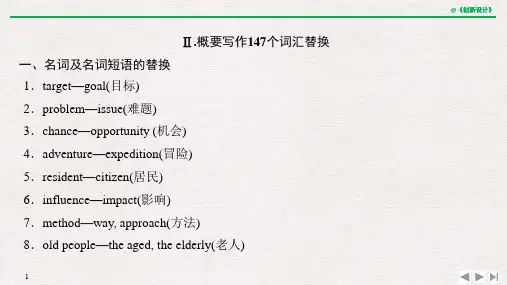
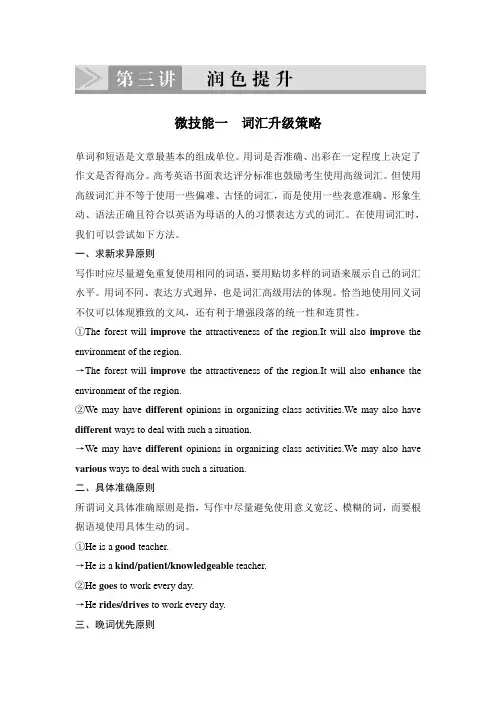
微技能一词汇升级策略单词和短语是文章最基本的组成单位。
用词是否准确、出彩在一定程度上决定了作文是否得高分。
高考英语书面表达评分标准也鼓励考生使用高级词汇。
但使用高级词汇并不等于使用一些偏难、古怪的词汇,而是使用一些表意准确、形象生动、语法正确且符合以英语为母语的人的习惯表达方式的词汇。
在使用词汇时,我们可以尝试如下方法。
一、求新求异原则写作时应尽量避免重复使用相同的词语,要用贴切多样的词语来展示自己的词汇水平。
用词不同、表达方式迥异,也是词汇高级用法的体现。
恰当地使用同义词不仅可以体现雅致的文风,还有利于增强段落的统一性和连贯性。
①The forest will improve the attractiveness of the region.It will also improve the environment of the region.→The forest will improve the attractiveness of the region.It will also enhance the environment of the region.②We may have different opinions in organizing class activities.We may also have different ways to deal with such a situation.→We may have different opinions in organizing class activities.We may also have various ways to deal with such a situation.二、具体准确原则所谓词义具体准确原则是指,写作中尽量避免使用意义宽泛、模糊的词,而要根据语境使用具体生动的词。
①He is a good teacher.→He is a kind/patient/knowledgeable teacher.②He goes to work every day.→He rides/drives to work every day.三、晚词优先原则为了展现自己的语言功底,吸引阅卷老师的眼球,尽量用高年级阶段学到的词汇代替低年级阶段学到的词汇。
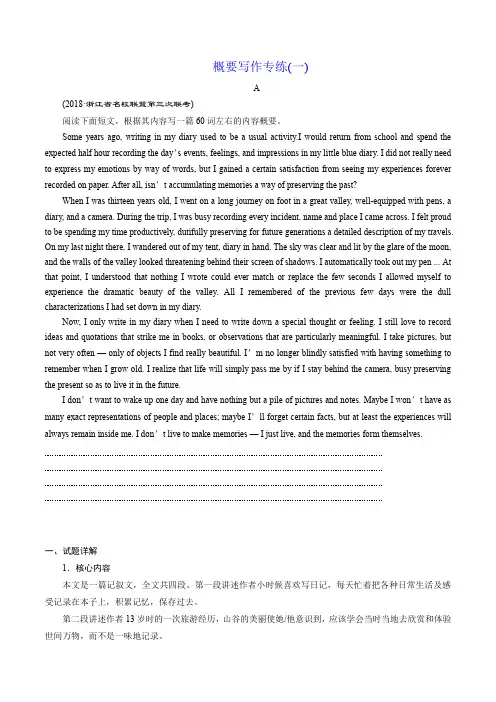
概要写作专练(一)A(2018·浙江省名校联盟第三次联考)阅读下面短文,根据其内容写一篇60词左右的内容概要。
Some years ago, writing in my diary used to be a usual activity.I would return from school and spend the expected half hour recording the day’s events, feelings, and impressions in my little blue diary. I did not really need to express my emotions by way of words, but I gained a certain satisfaction from seeing my experiences forever recorded on paper. After all, isn’t accumulating memories a way of preserving the past?When I was thirteen years old, I went on a long journey on foot in a great valley, wellequipped with pens, a diary, and a camera. During the trip, I was busy recording every incident, name and place I came across. I felt proud to be spending my time productively, dutifully preserving for future generations a detailed description of my travels. On my last night there, I wandered out of my tent, diary in hand. The sky was clear and lit by the glare of the moon, and the walls of the valley looked threatening behind their screen of shadows. I automatically took out my pen ... At that point, I understood that nothing I wrote could ever match or replace the few seconds I allowed myself to experience the dramatic beauty of the valley. All I remembered of the previous few days were the dull characterizations I had set down in my diary.Now, I only write in my diary when I need to write down a special thought or feeling. I still love to record ideas and quotations that strike me in books, or observations that are particularly meaningful. I take pictures, but not very often — only of objects I find really beautiful. I’m no longer blindly satisfied with having something to remember when I grow old. I realize that life will simply pass me by if I stay behind the camera, busy preserving the present so as to live it in the future.I don’t want to wake up one day and have nothing but a pile of pictures and notes. Maybe I won’t have as many exact representations of people and places; maybe I’ll forget certain facts, but at least the experiences will always remain inside me. I don’t live to make memories — I just live, and the memories form themselves.一、试题详解1.核心内容本文是一篇记叙文,全文共四段。
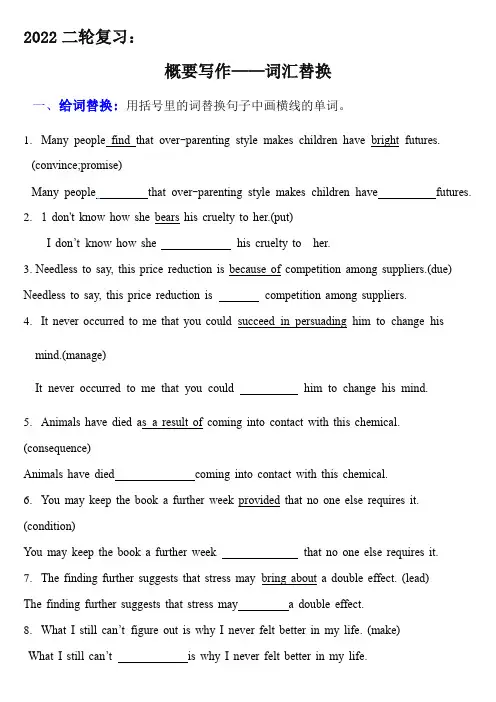
2022二轮复习:概要写作——词汇替换一、给词替换: 用括号里的词替换句子中画横线的单词。
1.Many people find that overᅳparenting style makes children have bright futures. (convince;promise)Many people that overᅳparenting style makes children have futures.2. 1 don't know how she bears his cruelty to her.(put)I don’t know how she his cruelty to her.3.Needless to say, this price reduction is because of competition among suppliers.(due) Needless to say, this price reduction is competition among suppliers.4.It never occurred to me that you could succeed in persuading him to change his mind.(manage)It never occurred to me that you could him to change his mind.5.Animals have died as a result of coming into contact with this chemical. (consequence)Animals have died coming into contact with this chemical.6.You may keep the book a further week provided that no one else requires it. (condition)You may keep the book a further week that no one else requires it.7.The finding further suggests that stress may bring about a double effect. (lead)The finding further suggests that stress may a double effect.8.What I still can’t figure out is why I never felt better in my life. (make)What I still can’t is why I never felt better in my life.9.You need to make good use of any opportunities to practice English.(advantage)You need to any opportunities to practice English.10.He asked several questions concerning the future of the company.(regard)He asked several questions the future of the company.11.Other European countries are also making efforts to reduce food waste. (measure) Other European countries are also reduce food waste.12.Chinese shoppers now make up 30 percent of the global luxury goods market, with about half of spending done abroad. (account)Chinese shoppers spending 30 percent of the global luxury goods market, w ith about half of spending done abroad.二、在给出的句子基础上自由替换1.Among the famous historical figures, I find Confucius impressive.2.It goes without saying that Confucius has a great effect on the values of later generations.3.Old as Zhong Nanshan is, he fought bravely against COVID-19, making great contributions in the field of medicine.4.Her charming personality lies in the simple fact that he never hesitates to help people in need.5.She gets up early and goes to sleep late every day. Besides, she works hard without complaining.6.Whenever people around get into trouble, she is willing to help them, which makes her respected by all our neighbours.7.She has been highly respected for her wisdom as well as courage by the Chinese people.8.Her spirit inspires me and millions of other girls to live an independent life and be responsible for our own decisions.9.He set so good an example for us students that we all should learn from him.10.I made up my mind to follow his example to take my own responsibility to be a reliable person. From then on, I'm confident that the future in front of me is bright. And I'd like to face it bravely, no matter what the challenge is.三、翻译句子并自由替换:翻译下列句子,完成后,对自己所写句子进行同义替换。
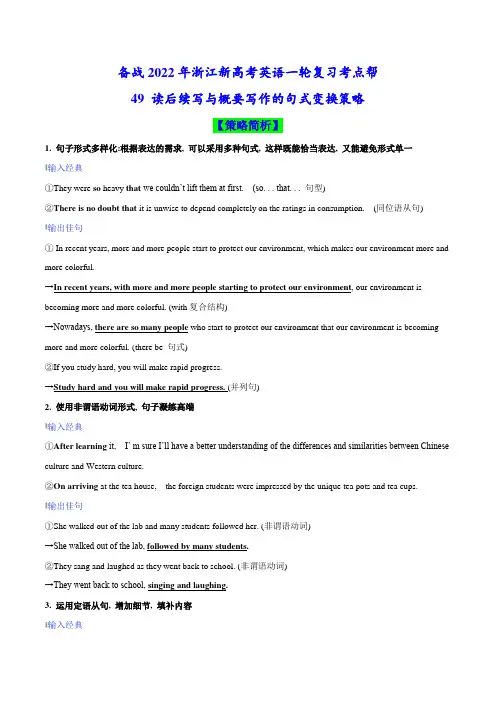
备战2022年浙江新高考英语一轮复习考点帮49 读后续写与概要写作的句式变换策略【策略简析】1. 句子形式多样化:根据表达的需求, 可以采用多种句式, 这样既能恰当表达, 又能避免形式单一输入经典①They were so heavy that we couldn’t lift them at first. (so. . . that. . . 句型)②There is no doubt that it is unwise to depend completely on the ratings in consumption. (同位语从句)输出佳句① In recent years, more and more people start to protect our environment, which makes our environment more and more colorful.→In recent years, with more and more people starting to protect our environment, our environment is becoming more and more colorful. (with复合结构)→Nowadays, there are so many people who start to protect our environment that our environment is becoming more and more colorful. (there be 句式)②If you study hard, you will make rapid progress.→Study hard and you will make rapid progress. (并列句)2. 使用非谓语动词形式, 句子凝练高端输入经典①After learning it, I’ m sure I’ll have a better understanding of the differences and similarities between Chinese culture and Western culture.②On arriving at the tea house, the foreign students were impressed by the unique tea pots and tea cups.输出佳句①She walked out of the lab and many students followed her. (非谓语动词)→She walked out of the lab, followed by many students.②They sang and laughed as they went back to school. (非谓语动词)→They went back to school, singing and laughing.3. 运用定语从句, 增加细节, 填补内容输入经典①Material collecting took us a whole week, during which we interviewed our teachers and took pictures of every aspect of school life.②I am eager to invite you to join our team for the upcoming event, in which you will demonstrate your ability and make acquaintance with more friends with the same interest.输出佳句①You’d better make full preparations before class and have a brief understanding of the history of Tang Dynasty, which makes it easy for you to go through the class(使你容易通过这门课).②Besides, there will be a lot of useful and interesting activities, from which you can have a clearer picture of Chinese culture(从中你对中国文化会有更清晰的认识).③I have found a flat for you on Fangcao Street near Jianxin Chinese school. It is on the third floor with three rooms, one of which is bedroom(其中一个是卧室), and the other two are bathroom and kitchen.4. 巧用倒装, 增强句子的表现力输入经典①Not only will our club’s works be displayed, but we also have a valuable set of paper-cutting created by a famous artist of this field.②Not only did you help improve my English, but you also gave me more confidence in learning.③Next came the moment when I asked them to have a try themselves.输出佳句①Though I’m weak, I’ll make the effort. (倒装)→Weak as/though I am, I’ll make the effort.②He had no sooner come back from Beijing than he was sent abroad. (倒装)→No sooner had he come back from Beijing than he was sent abroad.5. 恰当使用强调句, 增强说服力输入经典①It is you who taught me how to learn English well.②It was on Friday that our activity began.输出佳句①He did not know what had happened until he had read the news in the newspaper. (强调句)→It was not until he had read the news in the newspaper that he knew what had happened.②It is working in teams instead of on my own that has freed me of trouble and made my work more efficient.6. 自如应用各种名词性从句, 精彩纷呈输入经典①If you are interested in what I have stated above, sign up on our school website before September 1st.②That’s why I think the trip along the Yangtze River will be a better choice.输出佳句①To his surprise, the little girl knows so many things. (主语从句)→What surprises him is that the little girl knows so many things.②I have just found that I have to attend an important meeting that afternoon(我那天下午得参加一个重要会议).7. with or without精彩点缀, 妙不可言输入经典①Moreover, with the stadium set up, a wide range of sports events are able to be held, of which ping-pong, football as well as running competitions enjoy great popularity.②Without any hesitation, we began to work.输出佳句①As an old saying goes, living without a clear and achievable aim(没有清晰可达到的目标) is like sailing without a compass.②I can’t thank you enough for your generous help, without which I couldn’t have made such great progress(没有这些帮助我不能获得这么大的进步).8. 巧用副词, 充分表情达意输入经典①I am exceedingly delighted to hear from you.②I genuinely hope that you can squeeze some time for our festival and have fun with us.输出佳句①She patiently(仔细地) explained all the rules to the students and required everyone to follow them.②We were perfectly(完全地) satisfied with the result of the experiment.9. 语气委婉而中肯, 易于接受输入经典①If you have further questions, please feel free to let me know.②I sincerely hope you can set aside some time for the art feast.输出佳句①I wonder if you could tell me(你能否告诉我) what books I need to read and the requirements of my homework.②What do you think of it? Are you satisfied with it? If not, please tell me as quickly as possible(请尽快告诉我).【拓展运用】1.阅读下面短文,根据所给情节进行续写,使之构成一个完整的故事。
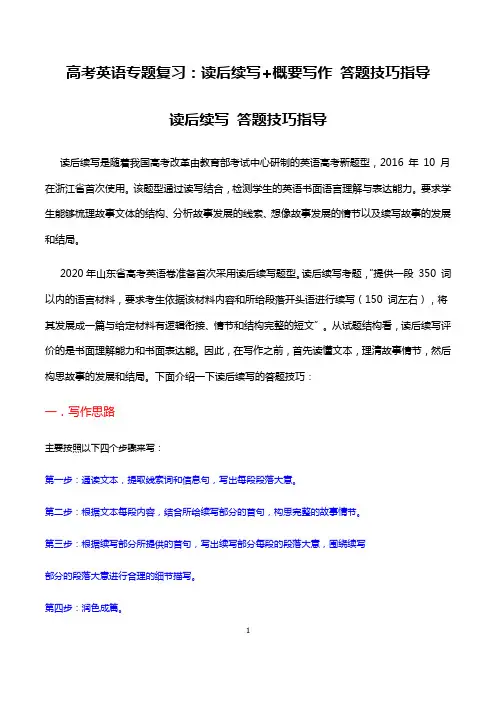
高考英语专题复习:读后续写+概要写作答题技巧指导读后续写答题技巧指导读后续写是随着我国高考改革由教育部考试中心研制的英语高考新题型,2016 年10 月在浙江省首次使用。
该题型通过读写结合,检测学生的英语书面语言理解与表达能力。
要求学生能够梳理故事文体的结构、分析故事发展的线索、想像故事发展的情节以及续写故事的发展和结局。
2020年山东省高考英语卷准备首次采用读后续写题型。
读后续写考题,“提供一段350 词以内的语言材料,要求考生依据该材料内容和所给段落开头语进行续写(150 词左右),将其发展成一篇与给定材料有逻辑衔接、情节和结构完整的短文”。
从试题结构看,读后续写评价的是书面理解能力和书面表达能。
因此,在写作之前,首先读懂文本,理清故事情节,然后构思故事的发展和结局。
下面介绍一下读后续写的答题技巧:一.写作思路主要按照以下四个步骤来写:第一步:通读文本,提取线索词和信息句,写出每段段落大意。
第二步:根据文本每段内容,结合所给续写部分的首句,构思完整的故事情节。
第三步:根据续写部分所提供的首句,写出续写部分每段的段落大意,围绕续写部分的段落大意进行合理的细节描写。
第四步:润色成篇。
1二.写作过程展示阅读下面材料,根据其内容和所给段落开头语续写两段,使之构成一篇完整的短文。
续写的词数应为150左右。
It was somewhere between spring and summer that my mom and I were driving through the countryside. Back then I was 13 years old and always felt unhappy with Mom. But little did I know that this trip was going to be a special one.A pot of flowers sat in the back seat, whose heavenly scent filled the car. Suddenly, in the middle of nowhere, my mom pulled over. “What are you doing?”I cried, fearing that the car had broken down and we’d be stuck there, so far from home. But that wasn’t the case. My mom hopped out of the car, grabbing the flowers from the back seat. “It’ll just be a minute,”she called back through the open windows.My eyes impatiently skimmed the edge of the road before settling on a little sign showing that it was a nursing home (养老院). I looked back at the building, somewhat annoyed, as my mom reappeared, empty-handed.Before she started the car, curiosity drove me to ask, “Do you know anyone there?”She shook her head. “Then what did you do with the flowers?”She smiled slightly, “I gave them to the receptionist (接待员).”“What?”She laughed at my confusion. “I told the receptionist to give the flowers to whoever needed them, especially those who haven’t gotten any.”2I kept silent for a moment. Not long after we continued our driving, I spoke again, “Did you leave your name?”To this she answered instantly, “No. Leaving flowers there for someone who will appreciate them makes me feel good, which is enough.”Suddenly, still thinking about Mom’s deeds, I heard something burst loudly. It was our car that broke down! Nothing could be worse, because neither my mom nor I understood how to repair it, and we didn’t know where the garage (汽车修理厂) was. It also seemed impossible to wait for any passerby, since we had seen so few along the way.Paragraph 1:We were worrying about what could be done.Paragraph 2:As we drove along, a flower shop came into sight.【写作思路】第一步:通读文本,提取线索词和信息句,写出每段段落大意。
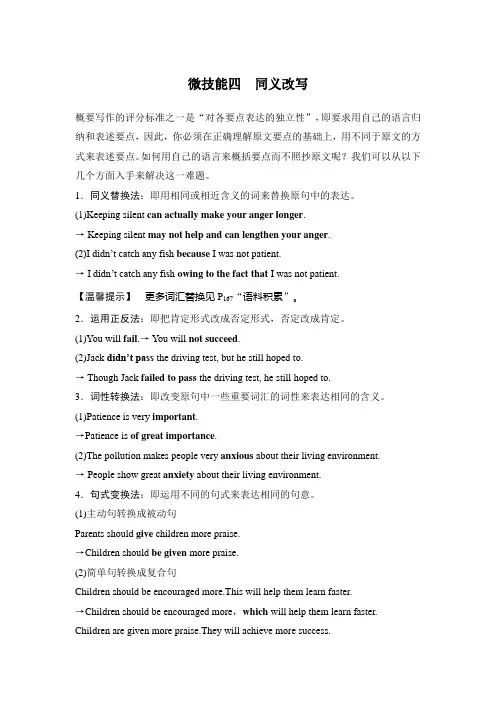
微技能四同义改写概要写作的评分标准之一是“对各要点表达的独立性”,即要求用自己的语言归纳和表述要点,因此,你必须在正确理解原文要点的基础上,用不同于原文的方式来表述要点。
如何用自己的语言来概括要点而不照抄原文呢?我们可以从以下几个方面入手来解决这一难题。
1.同义替换法:即用相同或相近含义的词来替换原句中的表达。
(1)Keeping silent can actually make your anger longer.→ Keeping silent may not help and can lengthen your anger.(2)I didn’t catch any fish because I was not patient.→I didn’t catch any fish owing to the fact that I was not patient.【温馨提示】更多词汇替换见P167“语料积累”。
2.运用正反法:即把肯定形式改成否定形式,否定改成肯定。
(1)You will fail.→ You will not succeed.(2)Jack didn’t pass the driving test, but he still hoped to.→ Though Jack failed to pass the driving test, he still hoped to.3.词性转换法:即改变原句中一些重要词汇的词性来表达相同的含义。
(1)Patience is very important.→Patience is of great importance.(2)The pollution makes people very anxious about their living environment.→ People show great anxiety about their living environment.4.句式变换法:即运用不同的句式来表达相同的句意。
读后续写技巧指导一、总体分析读后续写要求考生在阅读一段350 词以内的语言材料的基础上,根据该材料内容、所给段落开头语和所标示关键词进行续写(150 词左右),将其发展成一篇与给定材料有逻辑衔接、情节和结构完整的短文。
续写部分分为两段。
原文给出10 个左右的标有下划线的关键词语,所续写短文应使用5 个以上(教育部考试中心,2015)。
1. 原文特点《考试说明》虽未对读后续写材料的体裁做出明确说明,但根据所附的样题和自2016 年10 月首考至今的4 份真题来看,所提供的阅读材料一般是记叙文。
记叙文是以记人、叙事、写景、状物为主,以写人物的经历和事物的发展变化为主要内容的一种文体形式。
它的主要的表达方式是叙述和描写,也常辅以适当的抒情、议论和说明。
记叙文的特点是通过生动形象的事件来反映生活并表达作者的思想情感,它的中心思想蕴含在具体材料中,通过对人、事、物的生动描写来表现。
它的话题贴近生活,有一定趣味性,给学生的想象空间较大,上下文连贯性较强,结构清晰,语言难度较易把握。
2. 如何审题、谋篇、行文续写之前,首先应当审读原文,对故事内容进行把握和理解。
通过阅读,能判断文本的写作顺序(如时间先后顺序、地点变换顺序或情节发展顺序等),能找出故事的基本要素(如时间、地点、人物、事件等),能厘清文本的脉络和情节的发展,并据此对提供的文本内容进行归纳概括。
在审读原文的基础上,考虑如何对续写进行谋篇。
谋篇是对文本深入分析思考的过程。
分析文本中主人公的性格特点,思考人与人之间,人与社会间,人与自然间和人与自我之间的矛盾冲突,分析故事的起因和发展,思考和推断可能继续发展的方向,分析划线关键词和续写两段的段首句,思考具体的情节展现故事的高潮并合理结尾。
审题、谋篇的最终目的是要落实到续写上来。
读后续写的行文是对文本进行续写和完善的过程。
在内容上,要关注预设情节的逻辑性、合理性和思想性,要展现故事的主题、思想或哲理。
在语言上,要回看、体会并模仿原文的语言风格,以人物的动作、语言、心理描写为主,辅之以外貌和神态描写以及环境描写。
微技能六运用衔接手段概要写作的评分标准之一是“上下文的连贯性”,要求你有效地运用一定的衔接手段,使所写的句子连贯、流畅。
在概要写作时,我们可以借用三种衔接手段使上下文连贯,即词汇衔接、逻辑衔接和语法衔接。
......大逻辑连接词,承上启下再也不怕词穷。
1.因果关系(1)显性因:because, because of, for, as, since, in that, on account of, now that显性果:so, so that, therefore, as a result, thus, consequently, accordingly(2)隐性因果:①导致(因—果):cause, reason, lead to, give rise to, result in, stimulate, fuel, produce②由……而来(果—因):result from, derive from, originate from③反映,体现(果—因):reflect, present, demonstrate, suggest, imply2.转折关系but, however, yet, although, though, even though, even if, even, nevertheless, despite, in spite of, regardless of, anyway, anyhow, unfortunately, surprisingly3.举例关系for example, for instance, in this case, namely, as you know, like, such as, a case in point is..., in particular, including..., take...as an example, as for4.条件关系if, only if, if only, unless, lest, otherwise, as soon as, as long as, in case, suppose that, supposing that, provided that, providing that5.比较关系(1)相同点:similarly, in like manner, in comparison with, like..., likewise, similarly important, in the same way(2)不同点:yet, still, rather, neither...nor, unlike, as opposed to, in contrast, on the contrary, different from this, nevertheless, contrary to6.否定关系(1)显性否定:no, not, never, nor, none, neither(2)隐形否定:fail to, refuse, remove,reject, lack of(3)否定前缀:a-,ab-,dis-,il-,im-,in-,non-,un-(4)双重否定:not fail to, not illegal, not uncommon, not unavailable7.并列关系and, also, or, neither...nor, either...or, not only...but also, as well as, the same...as, then, besides, additionally, in addition, further more, what is more, on one hand...on the other hand, for one thing...for another, one...another, some...others...still others8.先后关系first, second, at last, next, previously, eventually, last but not least, to begin with, to start with, to end with, finally, since then, first of all, afterwards, following this9.强调关系in fact, especially, particularly, moreover, naturally, not to mention..., believe it or not, it is certain/sure that..., definitely, undoubtedly, in truth, obviously10.时间关系at once, immediately, in the meantime, meanwhile, at the same time, in the end, then,soon, later, at once, at last, finally, some time ago, at present, all of a sudden, from now on, from time to time, since then, when, whenever, a few minutes later, as, once, since, in a moment, shortly, previously【典例示范】【即时演练】阅读下面短文,选用适当的衔接词完成概要写作。
微技能五简化与合并信息概要写作要求用60词左右概括一篇350词左右的文章,因此需要对冗杂的信息进行简化和合并,以达到概括的目的。
简化和合并信息可以采用下列几种技巧。
1.删除细节:剔除细节信息,只保留主干内容。
In addition, if the school buys automatic handdryers, we can save money.There is a terrible waste of paper towels in the restrooms.→Additionally, it can help the school save money.2.简化描述:把长段的描述变成短小、简单的句子:如果材料中描述某人或某事用了好几个句子,那么你只要把它们变成一两句即可。
There were 30 cows on the farm that his grandmother had to milk every day.It was hard work for his grandmother.→His grandmother worked hard milking 30 cows daily.3.避免重复:在原文中,为了强调某个主题,可能会重复,应该删除或者合并这些重复信息。
They were waiting for the meeting to begin.They talked with each other.They talked about the women’s football team.The team had won victories in Guangzhou.→While waiting for the meeting to begin, they talked about the victories won by the women’s football team in Guangzhou.4.压缩长句:有些句子比较冗长,可以进行压缩和简化,使之简洁。
备战2022年浙江新高考英语一轮复习考点帮48 读后续写与概要写作中的词汇选用【策略简析】1. 词汇变身:替换常用简单词(1)动词变身(2)形容词、副词、介词变身bad disgusting, awful, terribleimportant significant, vital, essential, fundamental, crucialall kinds of a variety of, various, diverseabout concerning, relevant, related输入经典①On the o ne hand, too much praise might lead to children’s lack of enthusiasm to explore new things, for they are afraid they won’t meet parents’ expectations.②Considering the enormous benefits, which we can earn steadily from tennis practice, including preventing us from getting shortsighted and keeping physically healthy, we are lost in training course.输出佳句①The special day allows people to show their love and affection for(对……表达爱和情感) their fathers.②It’s advisable/wise(是明智的)for people to use their cell-phones more appropriately/properly(更恰当地).③Without sufficient preparation(没有充分准备), you can hardly expect to answer all the questions correctly and obtain satisfactory marks, let alone be admitted into a desirable university(梦想的大学).④Tracy said she had already informed Susan of(通知Susan) the change of the appointment.⑤People generally thought it impossible for the Chinese team to win the championship in the Rio Olympic Games, but they overcame many hurdles(克服许多障碍) and eventually worked miracles/wonders(最终成功).⑥Drama Night is scheduled to (预定)be held on the evening of next Friday in the theatre hall.⑦Additionally(此外), having been awarded scholarship twice in our school, I have excellent academic performance(极好的学术成就).⑧This phenomenon has become a concern/focus (成为焦点)we must face today because of many serious consequences (许多严重后果)caused by improper use of cell-phones.2. 变化所用词的词性在作文中, 可以通过改变一个词的词性, 使文章富有变化, 让阅卷者感受到考生对词汇各种用法的掌握水平和灵活运用的程度。
仅供个人参照英语建议信1.提出建议的句型I suggest that Why not do ?Why don’ t you do ? You would better do/ not do If I were you ,I wouldIt seems to me that you could You may consider doingI feel that it would be beneficia l if You may consider doingI think it would be more beneficial if you couldAs you may agree that I would like to suggest that2.结尾常用格式I hope that my suggestions are helpful for your decision-making anyway.I would be more than happy to see improvement in this regard.I believe that you will take my suggestions into serious account.I would be ready to discuss about this matter with you to further details.Whatever you decide to do,good luck with your studies/work!高级词汇替代连结词1.Firstly :previously, initially, foremost(adv,第一adj.最重要的)2.Generally: principally, mainly, basically, fundamentally,3.Then : subsequently (随后陆续的) , afterward (时间上的) , thereafter (逻辑上的) , secondarily, furthermorestly :ultimately, eventually, in conclusion, as a final point, last but not least,5.Too: in addition, besides, moreover, additionally6.And: plus, as well as, along with, in addition7.Or: otherwise, if not, before, or else8.So (adv): therefore, thus, consequently, accordingly,9.Because: as, due to, since, as to, in that, for the reason that, for, now that10.But: however, moreover, nevertheless, nonetheless, on the contrary, even if, while, despite the fact that11.Only: just, merely, barely, singly, solely, rarely Without :excluding12. Very:extremely, acutely, decidedly, deeply, exceedingly, greatly, highly,13.Actually: as a matter of fact, indeed, literally, trulyImportant : essential, significant, vital, crucial, profound,play a pushing,requisite,critical, fundamental,primary, elementary, underlying, rudimentary, basically, necessaryEXAMPLE:1.A is important to B.2.A plays an/a important role to B3.A is of (great\enormous\significant\awesome) to B.4.A means (a lot\a great deal\much) to B.5. The importance of A (to B) can never be(denied\igonred\doubted).6.Nothing is more crucial to B than A.7.A is to B what the foundation is to a skyscraper.difficult :demanding( 费神费劲的 ),laborious (艰辛的) ,formidable (艰巨的)仅供个人参照many : numerous, myriad, infinite,quantities of a (large) number of / (large) numbers of +可数名词复数plenty of +可数名词复数/不行数名词 a good/great many +可数名词复a large/huge amount of / large amounts of +不行数many a + 可数名词单数Small: minimum, diminutive, minute, petite, wee, undersized, teeny, tiny,little, petite (女子身高娇小)bad :adverse( 不利的 ),nagetivegood :excellent,outstanding,extraordinary,remarkableBig : massive, enormous, tremendous, giant, vast, large, huge, bulky,boring ;dull,tiresome,tedious( 无聊的ep: He that can read and meditate will not find his evenings long or life tedious.)worried :anxious,apprehensive,fraughtsad :depressed( 绝望的,失意的 ep: She felt very depressed about the future),. gloomy( 情绪低沉的ep: They found him in gloomy, downbeat mood.),frustrated( 丧气的 ep: Both sides appeared very frustrated at the lack of progress). famous:renowned(ep: The region is renowned for its outstanding natural beauty。